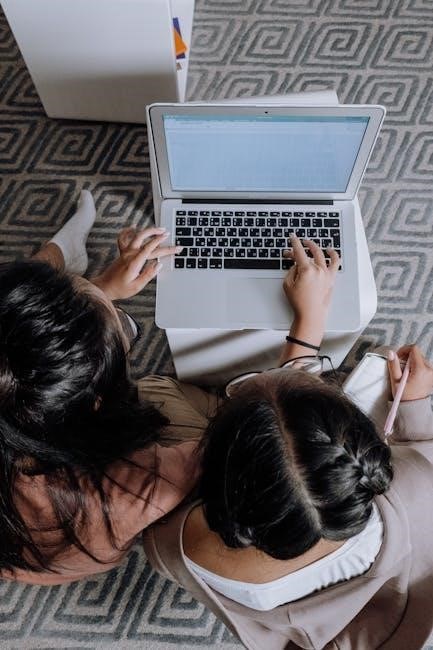This book, adapted by Sean Covey, offers practical advice for teens to develop essential life skills, empowering them to navigate challenges and become highly effective individuals.
Overview of the Concept
The 7 Habits of Highly Effective Teens, adapted by Sean Covey, provides a framework for teenagers to develop self-awareness, responsibility, and effectiveness in their personal and social lives. The book offers practical advice through relatable anecdotes, humor, and real-life examples, making it accessible to young readers. Each habit builds on the previous one, guiding teens to cultivate a proactive mindset, set goals, prioritize tasks, and foster healthy relationships. The concept emphasizes personal growth, self-care, and the importance of synergy, encouraging teens to become their best selves and achieve their full potential in a dynamic world.
Importance of Developing Effective Habits in Teenagers
Developing effective habits during the teenage years is crucial for building a strong foundation for future success. These habits help teens navigate adolescence with confidence, resilience, and purpose. By fostering self-discipline, responsibility, and goal-setting, effective habits empower teenagers to make better decisions, improve relationships, and achieve academic and personal goals. Cultivating these habits early on equips teens with the skills to overcome challenges, manage stress, and maintain a balanced lifestyle. Ultimately, effective habits lay the groundwork for long-term personal growth, enabling teens to thrive in an ever-changing world and become capable, independent individuals prepared for life’s opportunities and obstacles.
Sean Covey and the Adaptation for Teens
Sean Covey adapted his father Stephen Covey’s renowned 7 Habits for teenagers, making the principles relatable and accessible to a younger audience. Recognizing the unique challenges teens face, Sean infused humor, real-life examples, and practical advice tailored to their experiences. His approach ensures that the timeless wisdom of the 7 Habits resonates with teens, helping them build self-confidence, improve relationships, and achieve their goals. This adaptation has become a vital resource for teenagers worldwide, guiding them toward personal growth and effectiveness in their daily lives while maintaining the core principles of the original work.

Habit 1: Be Proactive
Being proactive means taking responsibility for your choices and actions, focusing on what you can control, and initiating positive change in your life and surroundings.
Understanding Personal Responsibility
Personal responsibility is about recognizing that your choices and actions shape your life. It involves self-awareness, accountability, and the courage to make decisions that align with your values. By understanding personal responsibility, teens learn to take ownership of their successes and setbacks, fostering resilience and confidence. This mindset helps them move beyond victimhood and focus on solutions rather than blame, empowering them to create positive outcomes for themselves and others. It’s the foundation for proactive behavior, encouraging intentional living and personal growth.
The Role of Choice in Shaping Behavior
Choices are the foundation of personal growth and effectiveness, allowing teens to shape their behavior and outcomes. Every decision has consequences, influencing who they become and how they interact with the world. By understanding the power of choice, teens can learn to respond intentionally to challenges rather than react impulsively. This proactive approach empowers them to take control of their lives, fostering self-awareness and accountability. Wise choices lead to positive habits and stronger character, enabling teens to navigate life’s complexities with confidence and purpose.
Practical Steps to Develop Proactivity
Developing proactivity involves taking intentional steps to control reactions and choices. Teens can start by identifying triggers that lead to reactive behavior and replacing them with thoughtful responses. Practicing self-awareness helps recognize emotions and thoughts before acting. Taking ownership of decisions, rather than blaming circumstances, fosters a proactive mindset. Encouraging positive self-talk and focusing on solutions rather than problems also builds proactivity. By consistently practicing these habits, teens can develop the skills to respond to challenges with confidence and purpose, leading to greater personal effectiveness and fulfillment.

Habit 2: Begin with the End in Mind
Begin with the end in mind by setting a clear vision and goals, ensuring daily actions align with core values and long-term purpose.
Setting Personal Mission Statements
Setting personal mission statements helps teens define their purpose and values, guiding their decisions and actions. It involves reflecting on what matters most and creating a clear, concise statement that serves as a personal compass. This practice encourages self-awareness, goal-setting, and alignment with core values. By defining their mission, teens can stay focused on long-term goals while making intentional choices. Sean Covey emphasizes the importance of this habit in helping teenagers navigate life’s challenges with clarity and purpose, fostering personal growth and direction.
Long-Term Vision and Goal-Setting
Developing a long-term vision and setting goals helps teens create a roadmap for their future. Sean Covey emphasizes the importance of envisioning what one wants to achieve in life. By setting SMART (Specific, Measurable, Achievable, Relevant, Time-bound) goals, teens can break down larger aspirations into manageable steps. This habit encourages accountability and focus, helping teens prioritize actions that align with their vision. The training provides frameworks for achieving goals, fostering a mindset of continuous improvement and purpose-driven living.
Aligning Daily Actions with Core Values
Aligning daily actions with core values ensures teens live authentically and purposefully. Sean Covey encourages defining personal mission statements to guide decisions, helping teens stay true to their beliefs. By understanding their core values, teens can make choices that reflect who they are and what they stand for. This habit fosters integrity, as actions align with principles, leading to a sense of fulfillment and direction. Practicing mindfulness and self-reflection helps teens evaluate whether their daily choices support their values, promoting consistency and character in all aspects of life. This alignment builds a strong foundation for long-term success and personal satisfaction.

Habit 3: Put First Things First
Habit 3 focuses on effective time management and prioritization. It teaches teens to organize tasks using the Time Management Matrix, ensuring they focus on what truly matters and avoid procrastination.
Time Management and Prioritization
Effective time management is crucial for teens to balance school, extracurricular activities, and personal life. By prioritizing tasks, they can focus on what’s truly important, reducing stress and increasing productivity. The Time Management Matrix helps categorize activities into four quadrants: urgent and important, important but not urgent, urgent but not important, and neither. This tool enables teens to allocate their time wisely, ensuring they complete high-priority tasks while minimizing distractions. Mastering this skill helps them achieve their goals and maintain a healthy work-life balance.
Using the Time Management Matrix
The Time Management Matrix, a tool introduced in the 7 Habits, helps teens organize tasks into four categories: urgent and important, important but not urgent, urgent but not important, and neither. By focusing on tasks that are important but not urgent, teens can prioritize meaningful activities, reduce stress, and boost productivity. This approach encourages them to avoid time-wasting activities and allocate their energy effectively, ensuring they accomplish what truly matters. Regular use of the matrix fosters discipline and helps teens achieve their goals while maintaining a balanced lifestyle.
Avoiding Procrastination and Distractions
Avoiding procrastination and distractions is key to effective time management. Teens can overcome these challenges by breaking tasks into smaller, manageable steps and setting clear deadlines. Minimizing distractions, such as turning off notifications or finding a quiet workspace, helps maintain focus. Prioritizing tasks based on importance and urgency ensures energy is spent on what truly matters. By staying committed to their goals and practicing self-discipline, teens can reduce procrastination and achieve greater productivity. This habit fosters accountability and helps teens build a strong foundation for long-term success.
Habit 4: Think Win-Win
Habit 4 focuses on fostering healthy relationships through mutual benefit and collaboration. By valuing others’ needs and seeking solutions that benefit everyone, teens build trust and respect.
Building Healthy Relationships
Building healthy relationships is core to Habit 4, emphasizing mutual respect and trust. Teens learn to value others’ needs, fostering collaboration and open communication. By understanding diverse perspectives, they create strong, supportive connections that benefit everyone involved. This approach encourages empathy, active listening, and conflict resolution, helping teens navigate social dynamics effectively. Healthy relationships are foundational for personal and collective success, promoting a positive environment where everyone thrives. This mindset shifts interactions from competition to cooperation, empowering teens to build lasting, meaningful bonds that enhance their lives and the lives of those around them.
Understanding Mutual Benefit in Interactions
Understanding mutual benefit in interactions focuses on creating outcomes where all parties feel valued and satisfied. This principle, central to Habit 4, teaches teens to seek solutions that benefit everyone involved. By thinking win-win, they learn to balance their own needs with the needs of others, fostering trust and respect. This approach encourages collaboration over competition, ensuring that relationships grow stronger through fair and considerate interactions. Mutual benefit not only enhances personal connections but also builds a reputation for reliability and integrity, which are essential for long-term success and happiness in all areas of life.
Practicing Empathy and Cooperation
Practicing empathy and cooperation involves understanding and valuing others’ feelings and perspectives. Empathy allows teens to connect deeply with others, fostering trust and stronger relationships. Cooperation encourages teamwork, where individuals combine their strengths to achieve common goals. By listening actively and showing compassion, teens can resolve conflicts more effectively and create harmonious interactions. This habit promotes a mindset of togetherness, helping teens build a supportive and inclusive environment. Mastering empathy and cooperation equips them to navigate social dynamics skillfully and contribute positively to their communities.
Habit 5: Seek First to Understand, Then to Be Understood
Habit 5 emphasizes the importance of listening before speaking, fostering mutual respect and stronger connections by prioritizing understanding over being heard.
Effective Communication Skills
Effective communication involves actively listening, expressing thoughts clearly, and understanding others’ perspectives. It requires empathy, clarity, and the ability to convey ideas without misunderstandings. By practicing these skills, teens can build stronger relationships and resolve conflicts more efficiently. Active listening, a key component, helps in truly comprehending others before responding. This fosters mutual respect and cooperation, essential for personal and social growth. Developing these skills empowers teens to communicate confidently and effectively in all aspects of life, fostering understanding and collaboration.
Active Listening and Its Benefits
Active listening is a powerful skill that enhances understanding and builds trust. By fully focusing on the speaker, avoiding interruptions, and asking clarifying questions, teens can gain deeper insights. This approach reduces misunderstandings and fosters empathy. Regular practice of active listening improves relationships, resolves conflicts, and strengthens communication. It also encourages others to feel valued and heard, creating a supportive environment. Mastering this habit helps teens become better friends, students, and future leaders, equipping them with essential tools for lifelong success and meaningful connections.
Overcoming Biases in Communication
Recognizing and managing personal biases is crucial for effective communication. Teens often unintentionally bring preconceived notions to conversations, which can hinder understanding. By staying open-minded and seeking diverse perspectives, they can reduce misunderstandings. Actively challenging assumptions and asking questions fosters deeper connections. This approach encourages empathy and mutual respect, helping to bridge gaps between individuals. Overcoming biases leads to more authentic and meaningful interactions, fostering trust and stronger relationships. It’s a key step in becoming an effective communicator and building a supportive, inclusive environment for everyone involved.
Habit 6: Synergize
Synergizing involves teamwork, collaboration, and valuing diverse perspectives to create solutions greater than individual efforts. It fosters innovation and achievement through collective effort and mutual respect.
The Power of Teamwork and Collaboration
Synergy thrives when individuals combine their unique strengths and perspectives to achieve common goals. By valuing diversity and fostering open communication, teams can unlock creative solutions and enhance productivity. Collaboration encourages mutual respect, trust, and shared accountability, leading to outcomes that surpass individual efforts. Teens can apply this habit by actively listening to others, contributing their ideas, and embracing collective problem-solving. This approach not only strengthens relationships but also equips them with essential skills for future success in both personal and professional realms.
Valuing Diverse Perspectives
Diverse perspectives enrich problem-solving by bringing unique insights and experiences to the table. When teens embrace differing viewpoints, they foster creativity and innovation. By listening to others without judgment, they cultivate empathy and understanding. This habit encourages teens to seek out varied opinions, challenge their own biases, and appreciate the value of collaboration. Valuing diversity not only strengthens relationships but also prepares teens to thrive in a global, interconnected world. Synergy emerges when individuals respect and celebrate the differences that make their contributions unique and meaningful.
Creating Solutions Through Synergy
Synergy is the art of combining diverse perspectives to create solutions greater than individual contributions. Teens can achieve this by engaging in collaborative efforts, sharing ideas, and building on each other’s strengths. When they work together, they unlock creative potential and develop innovative answers to challenges. Synergy fosters mutual respect and trust, leading to stronger relationships and shared success. By embracing this habit, teens learn to move beyond mere cooperation to a deeper level of teamwork, where collective intelligence surpasses what any one person could achieve alone. This approach cultivates leadership and problem-solving skills essential for future success.

Habit 7: Sharpen the Saw
Self-care is vital for teens to recharge and maintain effectiveness. Balancing physical, emotional, and mental health ensures continuous growth and well-being, leading to a fulfilling life.
Self-Care and Personal Renewal
Self-care and personal renewal are essential for maintaining energy and effectiveness. Teens can achieve this by engaging in activities that nourish their mind, body, and spirit, such as exercise, meditation, and hobbies. Regular self-care helps prevent burnout and fosters resilience. By prioritizing renewal, teens can sustain their efforts in other areas of life, ensuring they remain motivated and focused. This habit encourages a holistic approach to well-being, promoting balance and consistency in daily routines. Over time, it cultivates a mindset of continuous improvement and self-awareness, empowering teens to thrive in all aspects of their lives;
Balancing Physical, Emotional, and Mental Health
Balancing physical, emotional, and mental health is crucial for teens to maintain overall well-being. Regular exercise, healthy eating, and sufficient sleep are foundational for physical health. Emotional health requires self-awareness, expressing feelings, and building strong relationships. Mental health involves staying positive, managing stress, and engaging in activities that stimulate the mind. By addressing all three areas, teens can create a balanced lifestyle that supports their growth and effectiveness. This holistic approach helps them handle challenges, make better decisions, and foster a sense of harmony in their daily lives, leading to long-term success and happiness.
Continuous Improvement and Growth
Continuous improvement and growth are essential for teens to develop resilience and adaptability. By regularly reflecting on their actions and seeking feedback, teens can identify areas for self-improvement. Engaging in lifelong learning, whether through reading, new experiences, or skill-building, fosters personal development. Setting achievable goals and celebrating progress encourages a growth mindset, helping teens overcome setbacks and strive for excellence. This habit emphasizes the importance of self-awareness, accountability, and persistence in achieving long-term success and fulfillment, ensuring teens remain motivated to evolve and thrive in an ever-changing world.
Implementing the 7 Habits in Daily Life
By integrating the 7 habits into daily routines, teens can enhance their effectiveness. Consistent practice and mindfulness of each habit foster positive change, leading to personal growth and better decision-making.
Creating a Personal Action Plan
A personal action plan helps teens organize their goals and habits. Start by identifying key areas for improvement, then set specific, measurable objectives. Break these into smaller, manageable steps. Regularly track progress and reflect on what’s working. Adjust as needed to stay aligned with your mission statement. Celebrate milestones to maintain motivation. Using tools like planners or apps can enhance accountability. This structured approach ensures consistent practice of the 7 habits, fostering long-term success and personal development.
Overcoming Challenges and Setbacks
Setbacks are inevitable, but teens can learn to overcome them by staying proactive and focused on their goals. Reflect on habits like being proactive and thinking win-win to address challenges effectively. Surround yourself with supportive people who encourage growth. Identify the root cause of setbacks and adjust your plan accordingly. Celebrate small victories to stay motivated and maintain a positive outlook. Remember, failure is a stepping stone to success, and persistence is key to mastering the 7 habits.
Tracking Progress and Celebrating Success
Tracking your progress and celebrating achievements is crucial for staying motivated and building confidence. Use tools like journals or planners to monitor your growth. Acknowledge and celebrate small milestones, as they reinforce positive habits and encourage persistence. Reflect on how your actions align with your goals, and be kind to yourself when facing setbacks. Recognizing progress, no matter how minor, helps maintain momentum and fosters a sense of accomplishment. This practice strengthens self-discipline and reinforces the effectiveness of the 7 habits in your daily life;
Mastering the 7 habits empowers teens to build strong character, achieve goals, and foster lasting success. Continuous practice leads to personal growth and a fulfilling life.
The Long-Term Benefits of the 7 Habits
Adopting the 7 habits fosters resilience, self-awareness, and strong relationships; Teens develop a growth mindset, leading to long-term success in personal and professional life. These habits create a foundation for continuous improvement, enabling teens to overcome challenges and achieve their goals effectively. By prioritizing self-care and empathy, they build a balanced and fulfilling life. The habits promote leadership and character development, empowering teens to make positive impacts in their communities. Over time, these practices become ingrained, leading to lasting personal and professional growth.
Encouraging Others to Adopt the Habits
Teens who embrace the 7 habits can inspire others by leading by example. Sharing personal success stories and mentoring peers fosters a positive influence. Encouraging others to adopt these habits creates a ripple effect, building stronger relationships and a supportive community. By promoting empathy, collaboration, and mutual growth, teens can help others develop the skills needed for long-term success. This not only strengthens friendships but also empowers others to take control of their lives, creating a lasting impact and a culture of effectiveness.
A Final Call to Action for Teens
Embrace the 7 habits and take charge of your life by applying these principles daily. Start with small steps, like setting personal goals or practicing proactive choices. Share your journey with others, inspiring them to join you in fostering a culture of effectiveness. Remember, personal growth is a continuous process, and every effort counts. By committing to these habits, you’ll unlock your potential and create a brighter future. The power to change begins with you—start today and become the best version of yourself.
